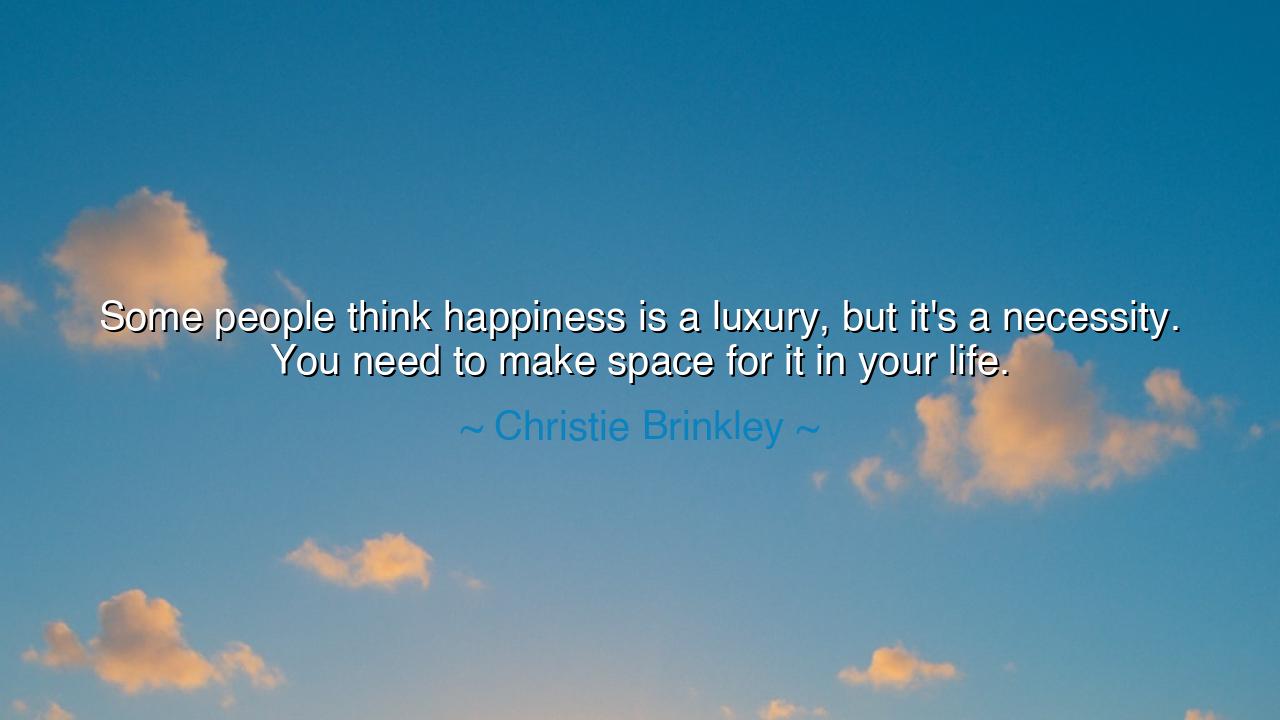
Some people think happiness is a luxury, but it's a necessity.
Some people think happiness is a luxury, but it's a necessity. You need to make space for it in your life.






When Christie Brinkley said, “Some people think happiness is a luxury, but it's a necessity. You need to make space for it in your life,” she was speaking not as a figure of glamour, but as a woman of experience — one who has walked through both the brilliance of fame and the quiet valleys of personal challenge. In her words lies a truth as old as humanity itself: that happiness is not a frivolous ornament of life, but the very breath of the soul, essential to our well-being and purpose. To treat joy as a luxury is to misunderstand the nature of existence. Just as the body requires air, water, and light, the spirit requires moments of joy, gratitude, and peace to remain whole.
In every age, philosophers and mystics have debated the meaning of happiness. To some, it was the fruit of virtue; to others, a fleeting pleasure. Yet Brinkley’s insight cuts through the confusion: happiness is not optional. It is not something we earn when the storms of life pass; it is something we must choose and create, even while the winds still rage. Happiness is not a reward — it is a discipline, a practice, a sacred duty. It demands space, attention, and care, as surely as a garden needs tending. Those who wait for life to grant them joy will grow weary; those who make space for it will find strength even in sorrow.
This wisdom has deep roots in human history. The ancient Stoics, who are often mistaken for stern philosophers of endurance, believed that the purpose of virtue was to attain eudaimonia — the flourishing of the soul, a calm and luminous happiness born from harmony with nature and reason. They taught that happiness does not depend on wealth or fortune, but on the inner cultivation of peace. Similarly, in Eastern tradition, the Buddha taught that joy arises not from attachment, but from awareness — that the mind, when still and compassionate, naturally gives birth to happiness as a lotus blooms from the mud. In every great tradition, happiness is revealed not as an indulgence, but as a spiritual necessity, the proof that the soul is in balance with the divine.
And yet, in our modern age, many have come to treat happiness as something secondary — a prize to be earned after success, or a reward granted only to those fortunate enough to have leisure. We fill our days with labor, ambition, and anxiety, telling ourselves that joy can wait until tomorrow. But tomorrow never comes. Thus, Brinkley’s words strike like a bell across the noise of modern life: “You need to make space for it.” This is not a suggestion, but a commandment of the heart. For happiness, like light, cannot enter a room that is already full of clutter. We must open the windows, clear the noise, and make room for the quiet joy that renews our spirit.
Consider the example of Helen Keller, who was born without sight or hearing, yet lived a life radiant with joy. She once wrote, “Keep your face to the sunshine and you cannot see the shadows.” Her happiness was not born of comfort, but of courage. She learned that to be alive is to choose where to direct one’s gaze — whether toward despair or toward light. In her daily practice of gratitude, learning, and compassion, she proved that even in darkness, the soul can shine. Her life stands as living testimony to Brinkley’s truth: happiness is not a privilege reserved for the untroubled, but a necessity for the soul’s survival, a form of inner light that no adversity can extinguish.
To make space for happiness, one must also learn the art of slowing down — of listening to the quiet music of life. The ancients spoke of sabbath, a sacred pause from labor, not merely to rest the body, but to refresh the soul. Today, our sabbath may be found in moments of laughter with loved ones, in the stillness of morning light, or in acts of kindness given freely. Happiness grows not in noise or haste, but in moments of presence — when we are truly awake to the gift of being alive. When we give time to joy, we discover that it was never far away; it simply waited for us to notice it.
So, my listener, remember this: happiness is your duty as much as your desire. It is not selfish to seek joy — it is self-destructive to ignore it. The world will demand your labor, your attention, your worry; it will fill your days with obligations that threaten to choke the life out of your heart. But you must resist. You must make space for what truly sustains you. Tend to your happiness as you would tend to a sacred flame — feed it with gratitude, protect it from bitterness, and share its warmth with others.
For, as Christie Brinkley teaches us, happiness is not a luxury of the fortunate, but the birthright of every soul. To live without it is to live half-awake; to embrace it is to honor the divine within you. So go forth and make space — not tomorrow, but today — for joy, laughter, and peace. For these are not mere pleasures; they are the lifeblood of the human spirit, the music that keeps us dancing even when the world grows silent.






AAdministratorAdministrator
Welcome, honored guests. Please leave a comment, we will respond soon